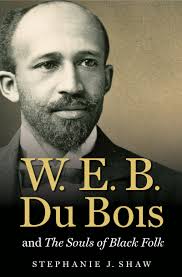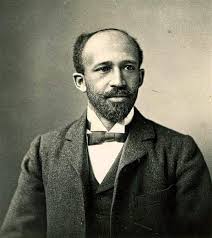The Souls of Black Folk Page #34
The Souls of Black Folk is a 1903 work of American literature by W. E. B. Du Bois. It is a seminal work in the history of sociology and a cornerstone of African-American literature. The book contains several essays on race, some of which the magazine Atlantic Monthly had previously published.
Similar to such measures is the unwritten law of the back districts and small towns of the South, that the character of all Negroes unknown to the mass of the community must be vouched for by some white man. This is really a revival of the old Roman idea of the patron under whose protection the new-made freedman was put. In many instances this system has been of great good to the Negro, and very often under the protection and guidance of the former master’s family, or other white friends, the freedman progressed in wealth and morality. But the same system has in other cases resulted in the refusal of whole communities to recognize the right of a Negro to change his habitation and to be master of his own fortunes. A black stranger in Baker County, Georgia, for instance, is liable to be stopped anywhere on the public highway and made to state his business to the satisfaction of any white interrogator. If he fails to give a suitable answer, or seems too independent or “sassy,” he may be arrested or summarily driven away. Thus it is that in the country districts of the South, by written or unwritten law, peonage, hindrances to the migration of labor, and a system of white patronage exists over large areas. Besides this, the chance for lawless oppression and illegal exactions is vastly greater in the country than in the city, and nearly all the more serious race disturbances of the last decade have arisen from disputes in the count between master and man,—as, for instance, the Sam Hose affair. As a result of such a situation, there arose, first, the Black Belt; and, second, the Migration to Town. The Black Belt was not, as many assumed, a movement toward fields of labor under more genial climatic conditions; it was primarily a huddling for self-protection,—a massing of the black population for mutual defence in order to secure the peace and tranquillity necessary to economic advance. This movement took place between Emancipation and 1880, and only partially accomplished the desired results. The rush to town since 1880 is the counter-movement of men disappointed in the economic opportunities of the Black Belt. In Dougherty County, Georgia, one can see easily the results of this experiment in huddling for protection. Only ten per cent of the adult population was born in the county, and yet the blacks outnumber the whites four or five to one. There is undoubtedly a security to the blacks in their very numbers,—a personal freedom from arbitrary treatment, which makes hundreds of laborers cling to Dougherty in spite of low wages and economic distress. But a change is coming, and slowly but surely even here the agricultural laborers are drifting to town and leaving the broad acres behind. Why is this? Why do not the Negroes become land-owners, and build up the black landed peasantry, which has for a generation and more been the dream of philanthropist and statesman? To the car-window sociologist, to the man who seeks to understand and know the South by devoting the few leisure hours of a holiday trip to unravelling the snarl of centuries,—to such men very often the whole trouble with the black field-hand may be summed up by Aunt Ophelia’s word, “Shiftless!” They have noted repeatedly scenes like one I saw last summer. We were riding along the highroad to town at the close of a long hot day. A couple of young black fellows passed us in a muleteam, with several bushels of loose corn in the ear. One was driving, listlessly bent forward, his elbows on his knees,—a happy-go-lucky, careless picture of irresponsibility. The other was fast asleep in the bottom of the wagon. As we passed we noticed an ear of corn fall from the wagon. They never saw it,—not they. A rod farther on we noted another ear on the ground; and between that creeping mule and town we counted twenty-six ears of corn. Shiftless? Yes, the personification of shiftlessness. And yet follow those boys: they are not lazy; to-morrow morning they’ll be up with the sun; they work hard when they do work, and they work willingly. They have no sordid, selfish, money-getting ways, but rather a fine disdain for mere cash. They’ll loaf before your face and work behind your back with good-natured honesty. They’ll steal a watermelon, and hand you back your lost purse intact. Their great defect as laborers lies in their lack of incentive beyond the mere pleasure of physical exertion. They are careless because they have not found that it pays to be careful; they are improvident because the improvident ones of their acquaintance get on about as well as the provident. Above all, they cannot see why they should take unusual pains to make the white man’s land better, or to fatten his mule, or save his corn. On the other hand, the white land-owner argues that any attempt to improve these laborers by increased responsibility, or higher wages, or better homes, or land of their own, would be sure to result in failure. He shows his Northern visitor the scarred and wretched land; the ruined mansions, the worn-out soil and mortgaged acres, and says, This is Negro freedom! Now it happens that both master and man have just enough argument on their respective sides to make it difficult for them to understand each other. The Negro dimly personifies in the white man all his ills and misfortunes; if he is poor, it is because the white man seizes the fruit of his toil; if he is ignorant, it is because the white man gives him neither time nor facilities to learn; and, indeed, if any misfortune happens to him, it is because of some hidden machinations of “white folks.” On the other hand, the masters and the masters’ sons have never been able to see why the Negro, instead of settling down to be day-laborers for bread and clothes, are infected with a silly desire to rise in the world, and why they are sulky, dissatisfied, and careless, where their fathers were happy and dumb and faithful. “Why, you niggers have an easier time than I do,” said a puzzled Albany merchant to his black customer. “Yes,” he replied, “and so does yo’ hogs.” Taking, then, the dissatisfied and shiftless field-hand as a starting-point, let us inquire how the black thousands of Dougherty have struggled from him up toward their ideal, and what that ideal is. All social struggle is evidenced by the rise, first of economic, then of social classes, among a homogeneous population. To-day the following economic classes are plainly differentiated among these Negroes. A “submerged tenth” of croppers, with a few paupers; forty per cent who are metayers and thirty-nine per cent of semi-metayers and wage-laborers. There are left five per cent of money-renters and six per cent of freeholders,—the “Upper Ten” of the land. The croppers are entirely without capital, even in the limited sense of food or money to keep them from seed-time to harvest. All they furnish is their labor; the land-owner furnishes land, stock, tools, seed, and house; and at the end of the year the laborer gets from a third to a half of the crop. Out of his share, however, comes pay and interest for food and clothing advanced him during the year. Thus we have a laborer without capital and without wages, and an employer whose capital is largely his employees’ wages. It is an unsatisfactory arrangement, both for hirer and hired, and is usually in vogue on poor land with hard-pressed owners.
Translation
Translate and read this book in other languages:
Select another language:
- - Select -
- 简体中文 (Chinese - Simplified)
- 繁體中文 (Chinese - Traditional)
- Español (Spanish)
- Esperanto (Esperanto)
- 日本語 (Japanese)
- Português (Portuguese)
- Deutsch (German)
- العربية (Arabic)
- Français (French)
- Русский (Russian)
- ಕನ್ನಡ (Kannada)
- 한국어 (Korean)
- עברית (Hebrew)
- Gaeilge (Irish)
- Українська (Ukrainian)
- اردو (Urdu)
- Magyar (Hungarian)
- मानक हिन्दी (Hindi)
- Indonesia (Indonesian)
- Italiano (Italian)
- தமிழ் (Tamil)
- Türkçe (Turkish)
- తెలుగు (Telugu)
- ภาษาไทย (Thai)
- Tiếng Việt (Vietnamese)
- Čeština (Czech)
- Polski (Polish)
- Bahasa Indonesia (Indonesian)
- Românește (Romanian)
- Nederlands (Dutch)
- Ελληνικά (Greek)
- Latinum (Latin)
- Svenska (Swedish)
- Dansk (Danish)
- Suomi (Finnish)
- فارسی (Persian)
- ייִדיש (Yiddish)
- հայերեն (Armenian)
- Norsk (Norwegian)
- English (English)
Citation
Use the citation below to add this book to your bibliography:
Style:MLAChicagoAPA
"The Souls of Black Folk Books." Literature.com. STANDS4 LLC, 2025. Web. 10 Jan. 2025. <https://www.literature.com/book/the_souls_of_black_folk_310>.




Discuss this The Souls of Black Folk book with the community:
Report Comment
We're doing our best to make sure our content is useful, accurate and safe.
If by any chance you spot an inappropriate comment while navigating through our website please use this form to let us know, and we'll take care of it shortly.
Attachment
You need to be logged in to favorite.
Log In